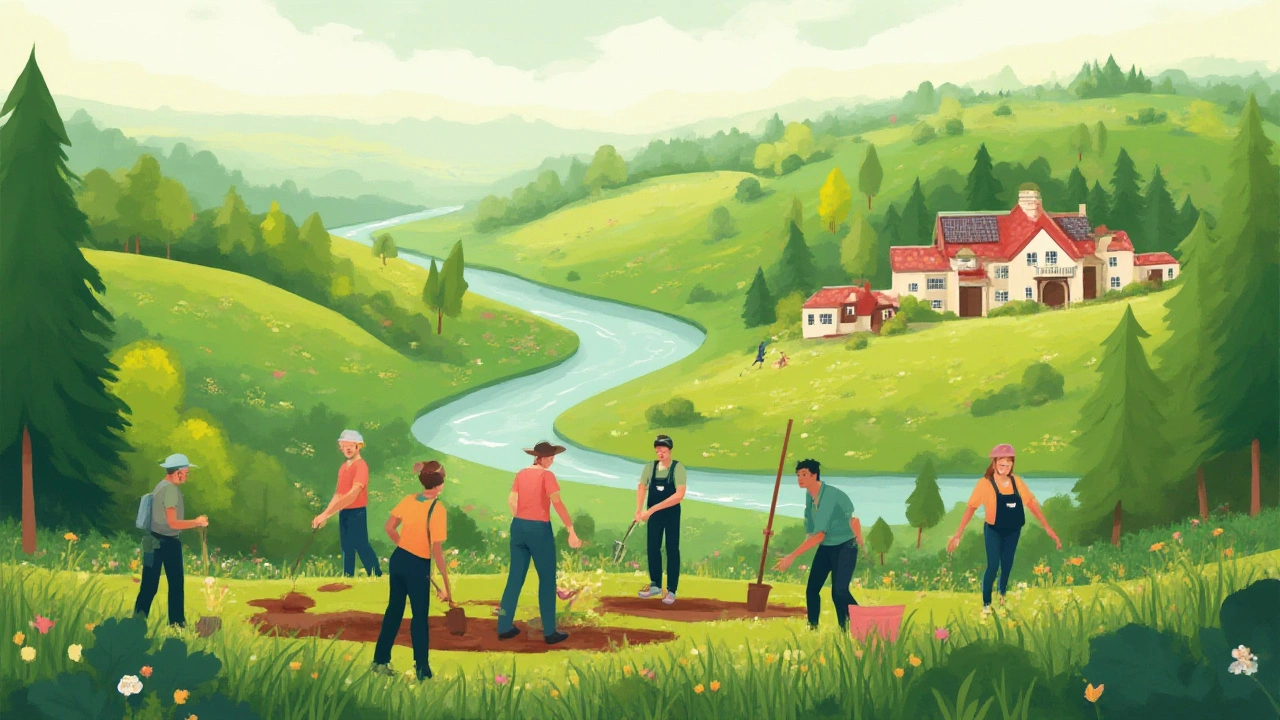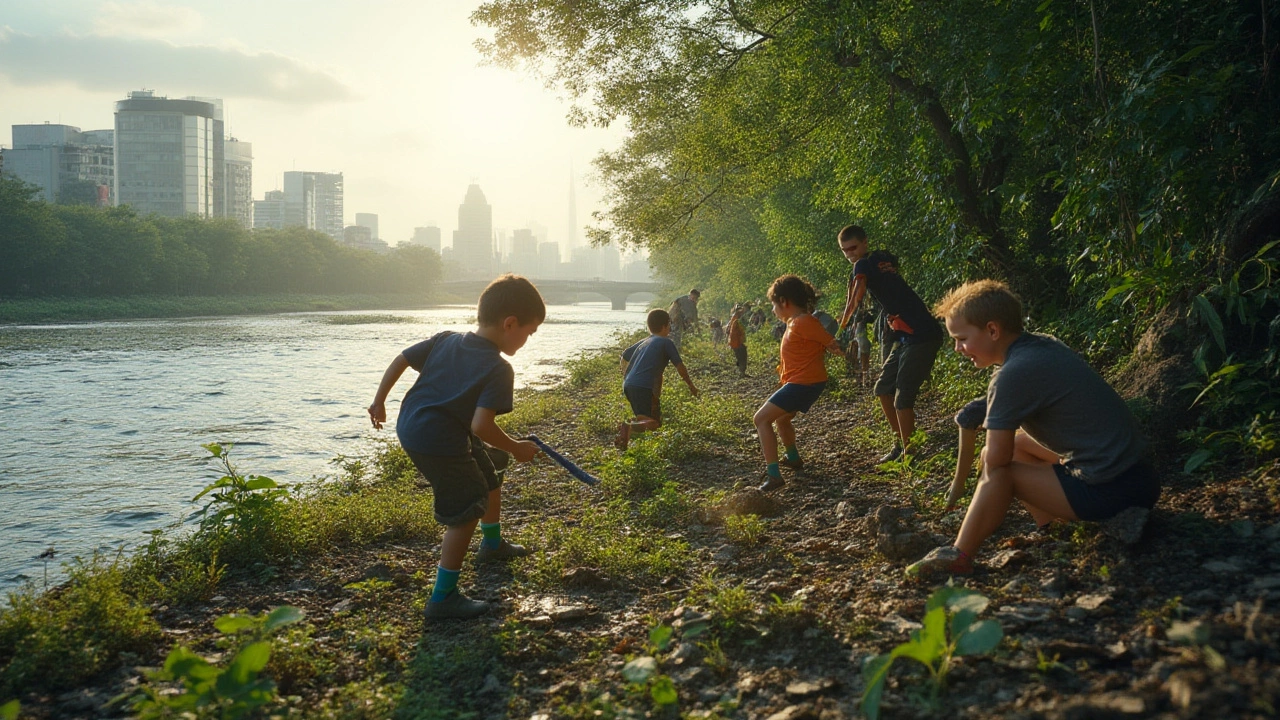Top Environmental Charities to Support in 2025 for Planet Protection
 Jul, 3 2025
Jul, 3 2025
Picture this: every time you take your dog for a walk (I’ve got a very stubborn spaniel called Rosie), you notice the changes – odd plastic wrappers poking from hedges, seasons swinging crazier than ever, or that one rare butterfly you haven’t seen in years. If seeing this makes you itch to do something, you’re not alone. While there’s only so much one person can do as they pick up litter on the daily dog walk, supporting the right charity can let your actions echo around the world. But which charity truly protects the environment? Not all foundations are created equal, and some are worlds ahead in real impact. It’s not always about planting trees and calling it a day. The landscape of green charities stretches far and wide, covering everything from climate science to wildlife rescue, plastic pollution prevention, and urgent lobbying work in government halls. The real puzzle is knowing which names rise above greenwashing, use donations well, and actually change things for the better. Let’s pull back the curtain and get specific.
The Biggest Movers: Trusted Environmental Charities Changing the Game
If you’re looking to make your hard-earned money really work for nature, don’t just toss it at the first group promising tree planting for your fiver. Of course, trees matter (my dog loves sniffing every one)—but there’s so much more to safeguarding the environment. The world is waking up, and environmental charities are morphing fast to cover whole ecosystems, protect species and fight for big policy reforms. A few stalwarts have been in the trenches for years and have the receipts to prove they’re still leading the charge.
Here’s an honest rundown of the big hitters—groups that protect the environment in the UK and globally, with concrete impact:
- WWF (World Wide Fund for Nature) – Famous panda logo, yes, but don’t let that fool you into thinking they’re cuddly. They’re behind some of the world’s toughest anti-poaching operations, habitat protection, and global sustainability policy pushes. Over 35 million hectares of protected land can be credited to WWF campaigns since their formation in 1961. Their UK arm now runs key river restoration, sustainable food, and ocean-protection projects.
- Friends of the Earth – Not just loud voices. Their pressure campaigns helped block fracking in the UK, and they’ve led pushes for cleaner air and tougher climate laws. They’re notorious for making governments sweat with their legal challenges and are behind grassroots groups across the UK for everything from hedgehog corridors to school air pollution monitoring.
- Greenpeace – Think of them as the activists in kayaks you see blocking oil rigs or, more recently, pushing hard for a global treaty on plastic production. Greenpeace has a knack for getting on the front page (in 2023, their campaign to protect the Antarctic Ocean reached over 200 million people). Their defenders on the ground and out at sea have a legendary record for stopping oil drilling and illegal fishing.
- RSPB (Royal Society for the Protection of Birds) – Don’t be fooled by the birds-only label; the RSPB works for entire wild habitats. In the last decade, they’ve helped reintroduce ospreys, bitterns, and cranes to British skies, secured 220 nature reserves, and run one of the UK’s most extensive citizen-science networks for tracking wildlife health.
- ClientEarth – Not your classic nature charity. Instead, they’re a legal powerhouse. ClientEarth’s lawyers use UK and EU courts to force polluting companies and negligent governments to clean up their act. Remember the legal crackdowns on illegal air pollution levels in London? That was ClientEarth in action.
- Surfers Against Sewage – Born on the beaches of Cornwall, they now lead UK-wide efforts against plastic waste, sewage spills, and water pollution. Their data-packed annual reports have spurred new bathing water regulations and forced water companies to foot up for filthy discharges.
Each of these groups takes on different angles: direct wildlife protection, legal challenges, protests, education projects, or all at once. They’re independently rated for transparency and stretch every pound—essential if you want your donation to bring real-world change.
Here’s a handy comparison table:
| Charity | Main Focus | 2024 Impact Highlight | Charity Navigator/Rating |
|---|---|---|---|
| WWF | Wildlife, Conservation | Protected 2M hectares rainforest | 4 Stars (US/UK equivalent: Excellent) |
| Friends of the Earth | Policy, Grassroots | Blocked 3 new fossil fuel projects in UK | Very Good (Third-party check) |
| Greenpeace | Direct Action | Stop deep-sea mining in North Atlantic | 4 Stars |
| RSPB | Wildlife, Habitats | Recorded 620k new wildlife volunteers | Very Good |
| ClientEarth | Legal & Environmental Justice | Won 7 major pollution cases | Excellent (Independent review) |
| Surfers Against Sewage | Ocean/Plastic Cleanup | Tracked 420+ sewage pollution events | Highly Trusted |
One thing everyone should know before picking a charity to back: size isn’t everything. Niche local groups (like Scotland’s Trees for Life rewilding initiative or London’s Air Quality Trust) often punch above their weight and might have ways for you to take action closer to home.

What Exactly Do These Charities Do For the Environment?
It would be easy to guess that "environmental charity" just means saving animals or planting trees, but their day-to-day work is a wild mix—sometimes literally life-or-death for whole ecosystems. Take WWF: while they shout about tigers and gorillas, a chunk of their time goes into working with farmers to make food production less harmful, tracking illegal logging with hidden cameras, and even funding local solar installations in remote African villages to slow forest loss. You’ll sometimes see their research in big climate reports quoted by governments, pushing leaders to sign up to tougher targets. They gather teams of scientists, policy experts, educators—even ex-poachers—to connect across the whole messy food chain.
Now look at Greenpeace. When they’re not dangling off oil rigs, they’re conducting undercover investigations, lobbying for single-use plastic bans, and building coalitions to block climate-wrecking deals at the last minute. Their fast response means spills, pollution leaks, or dodgy government policies don’t stay hidden. If you spotted companies suddenly backing away from fossil fuel investments in the 2020s, you can probably thank a Greenpeace campaign for the nudge.
RSPB manages nature reserves across the UK, some massive (like the Flow Country in Scotland) and tiny (urban pocket parks). Their teams restore peatlands—which lock away more carbon than forests—monitor rare birds like the curlew, and turn everyday people into wildlife recorders. They use apps, garden watch surveys, and local walks to monitor environmental health on an epic scale. They've helped shape UK farming subsidies so that wildflower meadows and hedgerows (yay, more hiding spots for hedgehogs…and Rosie’s nemesis, the fox) are better protected.
ClientEarth’s lawyers are different – you won’t see them wading through rivers picking up bottles, but you will find them in Supreme Court hearings dragging entire governments to account for failing clean air targets. In 2023, they forced major banks to reveal fossil fuel investments, which then led to new regulations.
Ever wonder who’s really behind those beautiful beach cleanups you see online? Surfers Against Sewage is famous for giant coastal litter sweeps, but they also organize campaigns to change UK sewage and single-use plastic laws. They’re known for clever citizen science projects, like networked water testers that let ordinary swimmers and families monitor pollution levels—leading to safer beaches and river bathing spots by summer 2025.
Friends of the Earth sits in a different lane: while they help run small wildflower corridors in city neighbourhoods, most of their firepower is legal and political. In 2024, their lobbying swung extra government support for onshore wind and cracked down on illegal car emissions. Their campaigns rely on people power: petitions, local branches, and banging on council doors until something actually shifts.
Many of these charities use tech to scale up. RSPB and WWF, for example, use satellite data to monitor forest health from space, letting them spot illegal fires or logging before they spread. Surfers Against Sewage’s online trackers let anyone see where the UK’s waters are safe—or not. And ClientEarth’s legal templates are now being used by environmental lawyers as far away as Japan and Peru, pushing for new safeguards and climate action in courts everywhere.

How You Can Support: Beyond Cash (and Making Your Help Go Further)
You don’t have to write a huge cheque or run a marathon in a bear suit (unless that’s your thing—do tag me if you do). Supporting environmental charities can fit into your daily life, whether you’re strapped for cash, time, or both. The obvious choice is becoming a regular donor; even small monthly amounts let groups budget better for big projects—like buying up new habitat land, running year-long legal fights, or rolling out education in schools.
But that’s not the only way your help matters. Many people skip their lunch break to pitch in on a local beach or park clean-up. You might join the thousands who log wildlife from their windows for RSPB’s annual Birdwatch, or test the river near your favourite wild swim spot for Surfers Against Sewage water quality projects. These actions give the charities vital data to target their work smarter.
Got a sharp pen or a bit of local clout? Writing directly to your MP with info from Friends of the Earth or WWF campaign toolkits puts vital pressure on government, especially before elections. Every big win—stricter emission targets, better protected reserves, bans on harmful chemicals—started as a groundswell of letters and emails from people who’d simply had enough with how things were.
It’s not just the old guard, either. New projects pop up every year to fix fast-moving problems, like the Big Give’s Green Match Fund which lets you double your donation during specific weeks, or Ecologi (based in Bristol) which lets you offset your carbon footprint by supporting a new windfarm or kelp project each month. Local groups—like the Scottish Wildlife Trust or London Wildlife Trust—offer volunteering, nature walks, or youth activities for people eager to get hands-on.
Looking for concrete impact? Here are five tips to be sure your support is well used:
- Check independent reviews: Look at Charity Navigator, Charity Commission UK, or GiveWell for honest ratings (avoid charities with more than 30% of donations sucked up by admin costs).
- Ask about impact: Good charities willingly share specific numbers—acres protected, pollution stopped, species recovered, laws changed—not just feel-good language.
- Consider giving time or skills: Many need lawyers, event organisers, graphic designers, or just extra hands on action days.
- Pick local if it matters: UK-based or Scotland-focused charities will often let you see results in your own backyard, perfect for feeling that instant spark of change.
- Stay in touch: Sign up for updates to know where your money goes—RSPB, for example, sends photos of newly arrived chicks or rewilded valleys as proof your donation made noise.
It’s easy to feel powerless with so much bad news coming at us. But every time you support an environmental charity—whether through donating, data gathering, or loud campaigning—you climb onto the shoulders of thousands around the world, all working in sync. You give these groups the fuel they need to keep air clean, waters safe, forests thriving, and cities just a little bit wilder. Even Rosie (notoriously unimpressed by most things) gets a glint in her eye when she finds more butterflies on our favourite footpath. Turns out, some good is contagious—one donation, one local action at a time.
